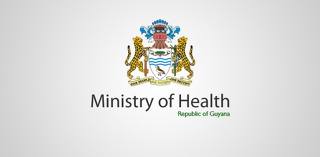Aided by its Strategic Plan which is being dubbed ‘Health Vision 20/20’, the Ministry of Health is poised to renew its delivery of health care premised on the two main pillars of primary health care and social determinants.
This notion was amplified recently when top health officials including Minister of Health, Dr. Bheri Ramsaran and Chief Medical Officer, Dr. Shamdeo Persaud briefed the media on the 2012 accomplishments and future plans of the Ministry.
Speaking directly to the issue of primary health care, Dr. Persaud said that “we know that there needs to be some strengthening of the primary health care services altogether.” However, he insisted that there has been much development of infrastructure and human resources. Added to this, he said, “I have been working on improving guidelines for management so that we have a consistent application of medical services that are of a good quality throughout the country.”
“Nevertheless, there are yet challenges in areas such as the delivery of laboratory services”, said Dr. Persaud, who is optimistic that “we can improve these services as time goes by. We are looking at developing those in terms of primary health care.”
He explained that a lot of work is currently done through mobile laboratory services and even in collaboration with some disease control programmes like malaria, where microscopy service is offered.
Like primary health care, Dr. Persaud noted that the social determinants are also very critical part to the whole process of renewing the delivery of health care since “we recognise that chronic Non-Communicable Diseases (NCDs) are a major challenge now…not only here in Guyana, but across the developed and developing world, so getting more people involved in health care is a critical part of this development.”
Accordingly, the Ministry’s Strategic plan entails a component which focuses on efforts which will be made to first of all facilitate the establishment of a National Commission on NCDs. This move, according to Dr. Persaud, is high on the Health Ministry’s agenda and comes as a recommendation of the Port of Spain Declaration which was signed by Caricom’s Heads of Government in 2007.
“At that forum, countries were asked to establish a body that could oversee and bring together all the stakeholders involved in the fight against NCDs”, said Dr. Persaud.
“So that Commission is being proposed…we hope that we will (this year) establish that Commission and the Commission will take this head-on.” However the Chief Medical Officer is convinced that all of the approaches dealing with the various risk factors cannot all be addressed by the Health Ministry, but other agencies must render support as well.
He was at the time alluding to the importance of diet, the choices of food and the need for more playfields and exercise to help address the impact of NCDs, which are often fuelled by lifestyle choices.
“It is a complex area involving not only Health, but also the Ministries of Agriculture, Trade and Culture, Youth and Sport, and these are some of the things we want to work on as priority for 2013,” Dr. Persaud added.
As part of its NCDs programme, he noted that efforts will also be made to look at the expansion of health promotion and utilising some of the media outfits that can actually meet young people and children in particular.
In this regard, Dr. Persaud said that efforts will be made to take advantage of the learning channel and the One Laptop Per Family (OLPF) initiative.
“I understand that very soon we will set up clubs at about 10 schools to commence access by OLPF recipients to the internet. We hope that we can utilise that mechanism to share some vital information on diet and exercise and things that children need to do to reduce the prevalence of teen and adolescent obesity in our society.”
- Home
- News
- Views
- Opinion
- Editorial
- Features
- Clinical
- Regions
- Anguilla
- Antigua and Barbuda
- Bahamas
- Barbados
- Belize
- Bermuda
- British Virgin Islands
- Cayman Islands
- Dominica
- Grenada
- Guyana
- Jamaica
- Montserrat
- Saint Kitts and Nevis
- Saint Lucia
- Saint Martin
- Saint Vincent and the Grenadines
- Saint-Barthélemy
- Trinidad and Tobago
- Turks and Caicos Islands
- US Virgin Islands














